The idea of comparing a Doberman vs German shepherd may seem like a futile exercise to keen breeders and fans of both of these pure breed dogs.
GSD lovers will always say that their breed is the greatest dog around because it has so many wonderful qualities and no flaws, at least none that they can see.
Dobermans are understandably strong characters with their own pros and cons, but owners say that once they started owning this intelligent, charismatic breed, they couldn’t move on to any other.
The question is still relevant, however, for any potential dog owner that sees the potential of both of these big, loyal dogs, but wants to understand the differences more clearly to make an informed choice.
Some may assume that they are similar because of their background, but there is more to these dogs than that.
There is the initial notion that the Doberman and German shepherd are pretty similar because they are both large working dogs.
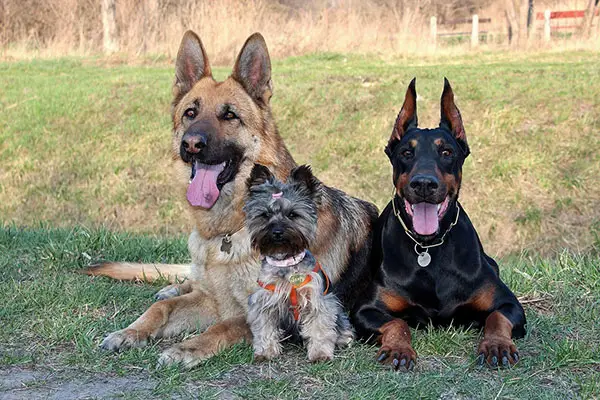
Dobermans were first bred in Germany in the early 1900s as guard dogs and were later brought into other countries, such as the US after the Second World War for use as police and military dogs.
GSDs – as they are sometimes informally known – are a little older, but their origin story is pretty much the same. These dogs have been bred for their strength as working dogs – the shepherds leaning towards herding rather than guarding – and this has continued with new roles in the military and security over the last century.
Think about the Doberman as a working police or military dog and you may quickly realize that you haven’t seen one in that capacity for a long time.
The German Shepherd is indeed favored as the top dog in these industries because of their wide range of skills and temperament. This popularity also continues with the search for the ideal family pet, as GSDs are more commonly owned than Dobies.
This does not mean that German Shepherd is sure to be the better choice, however, as it can all depend on the family, the individual dog and other factors. You may fall for the nature of the loyal, bright Doberman and appreciate aspects of their care that the shepherds don’t offer. Don’t assume that because most people seem to prefer the GSD, you will too.
Some see these big dogs as aggressive guard dogs, ideal for the military or police and nothing more, but this does not do either justice and there are actually a lot of differences between the two.
In order to take a closer look at the two breeds and their similarities and differences, this guide will look at a number of the key areas where these dogs share traits and show key contrasts. We will start with the physical differences between the two, including the issue of grooming, before looking at the temperament of the dog.
This means a closer look at behavioral traits and the intelligence of these dogs. From there, the health of the two breeds will be discussed before a final list of pros and cons is drawn up.
The obvious contrasts to look at when comparing the German shepherd vs Doberman Pinscher are the physical differences.
Dobermans are agile, athletic dogs with a lean muscular shape and pointed face. German shepherds are a little stockier with shorter back legs and sloping back, which can also make them a touch shorter than Dobermans on average.
By 12 months, a Doberman will be 27” on average while the shepherd reaches 26”. German Shepherds also tend to weigh a little more between 75 and 95 pounds compared to the 65-90 pounds of the Doberman.
German shepherd and Dobermans coats
The coats of these two dogs could not be more different.
The Dobie has a short coat with fine thick hair that is pretty low maintenance and provides all the protection they need.
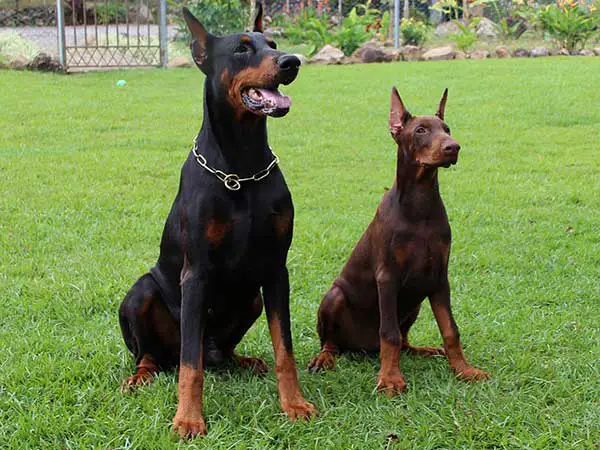
German Shepherds, meanwhile are built to withstand much colder temperatures on long patrols so have a longer, thicker coat of dense hairs. There is also a difference in the color variants that can be found.
GSDs tend to be more uniform in the colouration, with the same black and tan markings seen across the world.
Some are naturally paler or darker than others depending on their parentage, and there are also black and white Shepherds as well. These are perhaps less desirable to some breeders.
With the Doberman, the standard black with tan markings are the norm, but there are other colors that can be bred including black, white, red, chocolate and blue. These colors are much rarer and desirability depends on the owner.
The difference in coats does, of course, mean different grooming needs. While some say that this GSD coat is still pretty low maintenance, there is still grooming to consider and the issue of shedding.
Owners that are worried about pet hair across the house will love the coat of the Doberman because there is such minimal shedding and no need for excessive grooming.
Germans Shepherds, meanwhile, require a lot more attention as the shedding is more frequent, more noticeable and there are seasonal moults to contend with. Regular brushing and bathing to dislodge the loose hairs will help, but be sure to be careful with the right tools and products to avoid damage the hair or skin.
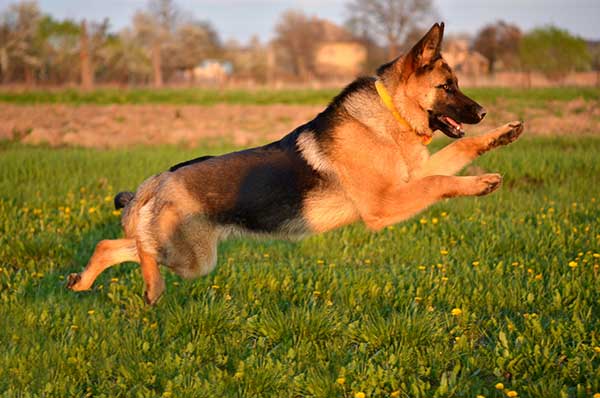
The German shepherd vs Doberman: why are GSDs seen as being the “all-round dog”?
When reading blogs, guides and other areas of debate on the subject of German Shepherds and their relation to Dobermans, you are sure to come across more than one example of an owner that is referring to them as the ideal “all-round dog” and the perfect companion.
This immediately leads to the impression that these dogs have far more positive traits and provide more for owners than other breeds. The issue with the coat puts this into question, so what it is about the nature and behavior of the GSD that gives them this title? What makes them more appealing than the Doberman?
The German shepherd temperament vs the Doberman temperament
The temperaments of these dogs are actually pretty similar because of their genetic traits and the way they have been bred over the century.
Both are seen as alert, intelligent dogs with a desire to protect the family, or in their eyes the pack, and both express plenty of loyalty to their family and master.
In some cases, aggression can be seen in both – because of their working heritage – but this can be trained and controlled well enough.
The difference with GSDs is that they are seen as being more gentle and soft natured in comparison to the energetic, responsive nature of the Doberman.
The intelligence of the Doberman and GSD is another aspect of the personality of both breeds that should be ignored at the peril of any prospective owner. This is great for working dogs but can pose pros and cons when training.
GSDs are quick to learn and are great at learning tasks with minimal repetition. Once that have a trick or command down, they are pretty much set. The stubbornness and sharp mind of the Doberman can be trickier to deal with as they can get a little bored with tasks and try to take control.
It is important with both these dogs that they receive plenty of care and attention and mental stimulation. This means games and food puzzles but also plenty of room to run around.
With this in mind, it should be noted by all hopeful owners of both breeds that they need space and a yard to burn off energy and get exercise. Apartment living does not suit these dogs.
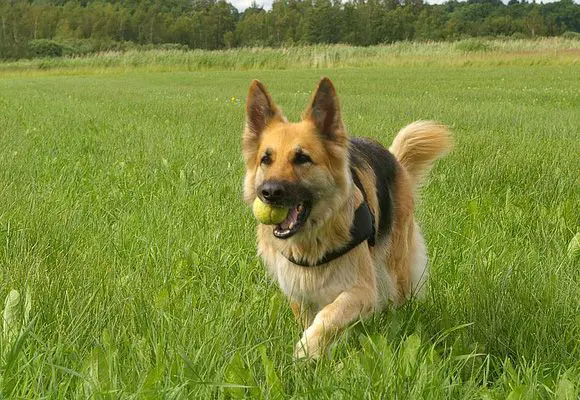
What considerations need to be made when training these different breeds?
One of the downsides of owning a Doberman is the notion that they can be very difficult to to train. Their intelligence is a definite plus here, but it can be too easy to let these dogs get their own way and assert their dominance if you do not show a firm hand from an early age.
With the right approach, both breeds can be trained to be obedient, happy members of the family.
Be firm and consistent, but fair and positive, and use verbal commands with GSDs for the best results.
Are there any clear behavior problems with these breeds that you need to watch out for before making any sort of commitment?
A concern regarding Dobermans is the idea that they are not good around children. A Doberman puppy can be brought up with kids and is likely to form a great bond with them that lasts throughout their childhood, but adopted adult dogs could be more of a problem, especially if they have bad habits that they may be stuck with.
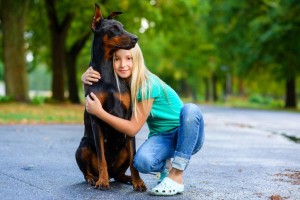
Another issue that may be noticed by new owners is that of vocalization. As these dogs are bred to work and guard, they are inclined to bark at intruders and warn off dangerous individuals. This can be a problem when an unfamiliar visitor comes to the house. Intelligence and strong mindedness can also lead to selective hearing and disobedience in dogs, particularly with Dobies.
If you are concerned about the pressure of training these big, intelligent breeds correctly and need a helping hand along the way, a training school or guide could be a great tool. It can take time and patience with these dogs, as there is a lot for them to learn in a short space of time, but it is definitely worth the effort.
Online resources like Doggy Dan’s training course are a great alternative for owners what want a simple, accessible guide on how to become a “pack leader” and deal with aggression, vocalization, disobedience and selective hearing.
Does this all mean that GSDs the better guard dogs?
The temperament of the German shepherd and its ability to learn and respond to threats means that it is understandably seen as a great guard dog for properties and families.
It has a loyalty to the family that allows it to stand guard and remain vigilant at all times – while still being loving and careful around children – but there is power in that build and any trespassers or burglars will immediately be intimidated by the dog if they come across it, with the added risk of a nasty bite.
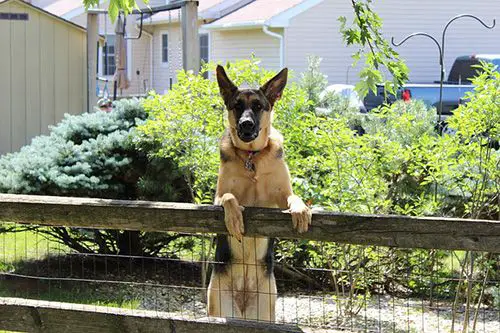
Surveys on the ideal guard dog for family homes tend to place the German shepherd at the top of the pile, with the Doberman pinchers coming a little further down. The reason for this has to be that the Doberman is clearly seen as one of the most capable, strong guard dogs in the world, with the ability to chase down attackers and the tenacity to hold them off until they are called back. This is great in a professional environment, or when working with the police or military, but it is a little different in a family home.
One of the key criticisms that you will always hear about the temperament of these dogs is that they are not as good with children, and there are others that see them as being a little narrow minded and high strung. This may not be as useful in a family home. What places these dogs so high on the list, however, is the fact that these dogs are incredibly loyal to their masters and families. What some see as a head-strong stubbornness could turn out to be the will to fight for a family at all costs.
Doberman pinscher vs German shepherd: which is the healthiest?
The life expectancy of these breeds is actually pretty similar. The average is 12 years for both, although this can all depend on their health. Dobermans are seen as being one of the easiest dogs to take care of because they are less prone to health issues and just need a good diet and exercise regime to thrive in a family home.
As with all dogs, regular vet visits are a must to ensure the dog is getting the right food, treatment and health care regime, but there are some breed-specific issues to be aware of.
Although the Doberman is seen as the healthier of the two, there are some possible health issues to watch out for. Cardiomyopathy and Cervical Vertebral Instability (CVI) could be a big problem if not monitored and there are also smaller concerns about hip dysplasia, gastric torsion, Von Willebrand’s disease and nacrolespsy.
Cardiomyopathy is also a potential problem in GSDs, but the bigger concern is dysplasia of the hips and elbows. These dogs can really suffer from joint problems and this can only get worse with age. Owners should also be aware of skin issues like allergies and dermatitis and cataracts.
- ACTIONABLE HEALTH INSIGHTS: Test for over 270 genetic health conditions and get actionable insights to help you give your pup the best care possible….
- MOST ACCURATE BREED IDENTIFICATION: Test for over 350 dog breeds including dingoes, coyotes, wolves, and village dogs. Using a research-grade…
- TRAIT INSIGHTS THAT HELP YOU BE MORE PREPARED: Test for 55 physical traits. Size, coat, grooming needs — your dog’s traits don’t just make them…
Last update on 2025-01-13 / Affiliate links / Images from Amazon Product Advertising API
The pros and cons of the German Shepherd
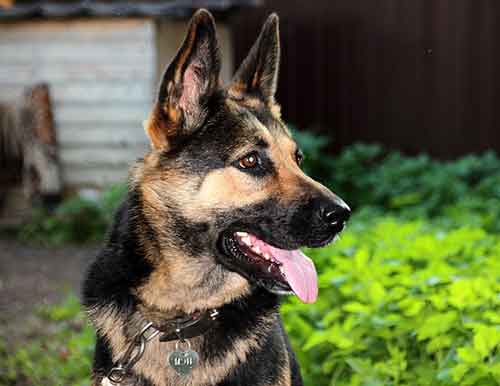
Pros:
1 – The breeding of the dog makes them loyal, protective companions and guard dogs that can have a strong place in a family.
2 – They have a strong body and beautiful coat.
3 – They are pretty good with children and are seen as a great family pet.
4 – The temperament is generally a nice blend of a protective, gentle dog with a lot to offer – hence this idea of the “all-round” dog.
5 – They are intelligent dogs that are fairly easy to train.
Cons:
1 – The coat does come with shedding issues and needs some maintenance.
2 – These dogs have a number of potential health issues to watch out for, especially regarding their joints.
The pros and cons of the Doberman
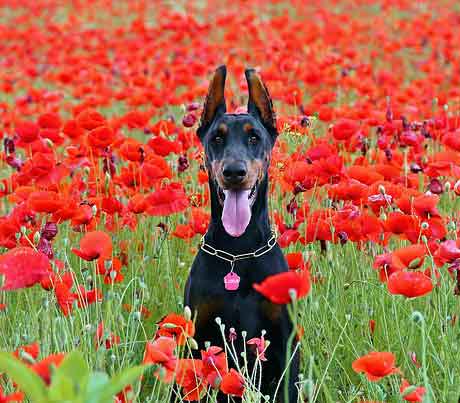
Pros:
1 – Again, the breeding of the dog makes them loyal, protective companions and guard dogs that can have a strong place in a family
2 – They are also strong, attractive dogs with a great build and height
3 – There is the added benefit here of a low maintenance coat and minimal shedding.
4 – These dogs are seen as being pretty healthy and easy to look after.
5 – They are very intelligent dogs where careful training really does pay off.
Cons:
1 – They have a more complex character and temperament that makes them a little more energetic and stubborn.
2 – They do not always fit into homes with small children.
German shepherd or Doberman: which is the best choice for your family?
Before reading this guide, you may well have been leaning towards getting a German Shepherd because of general opinion on the breed and the sense that they have more to offer. As this guide has shown, however, there are pros and cons to owning both breeds.
You will get a great companion with both dogs – both of which can be loyal, fun, loving members of the family – but there are additional pros and cons.
A GSD may be better with kids and easy to train, but they will shed a lot more and have higher vet bills.
A Doberman, on the other hand, may not always fit in with small children and can be more head-strong, but they are strong, healthy, intelligent dogs requiring little effort.
The final decision in the choice of Doberman vs German Shepherd ultimately comes down to your personal needs from the dog.
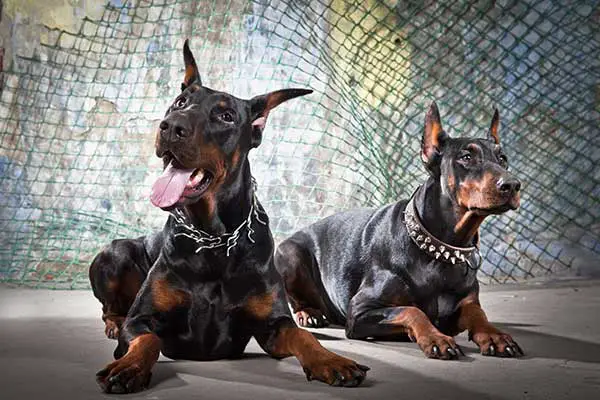
Checkout Our Favorite Dog Products
1. BEST PUPPY TOY
We Like: Snuggle Behavior Toy with Heart Beat & Heat Pack – Ideal toy for new puppies.
2. BEST DOG TRAINING PROGRAM
We Like: Doggy Dan The Online Dog Trainer – Stop any dog problem and raise the perfect puppy with The Online Dog Trainer.
3. BEST FOOD FOR DOGS AND PUPPIES
We Like: Victor Super Premium Pet Food – Ideal for growing puppies and pregnant or lactating females. Also provides sustained energy for sporting dogs and dogs with high physical demands.
4. BEST DOG DNA TEST
We Like: Embark Dog DNA Test – Embark screens for over 250 dog breeds + tests for 170+ genetic diseases including MDR1 drug sensitivity, glaucoma, degenerative myelopathy, and dilated cardiomyopathy, some of the most common adult-onset diseases in dogs.
5. BEST DOG PUZZLE TOY
We Like: Outward Hound Interactive Puzzle Toy – Every dog loves chasing squirrels at the park. The Outward Hound Hide-a-Squirrel Puzzle Toy gives your dog the same feeling as though he was outdoors chasing live squirrels.
6. Best Vacuum to Tackle Pet Hair
We Like: ORFELD Cordless Vacuum – Engineered for homes with pets. With features and tools that dig out dirt, hair and allergens everywhere your pet gets.

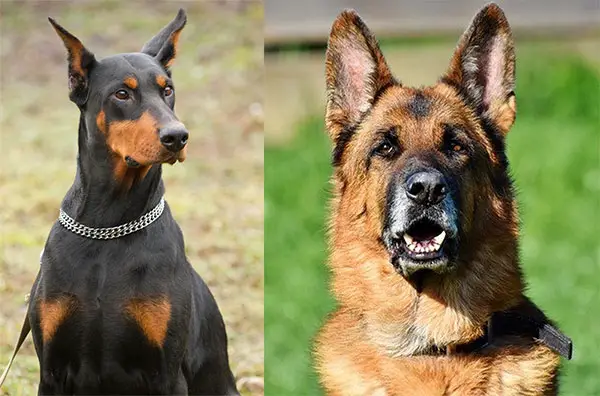
 (@miladoggiee)
(@miladoggiee)
